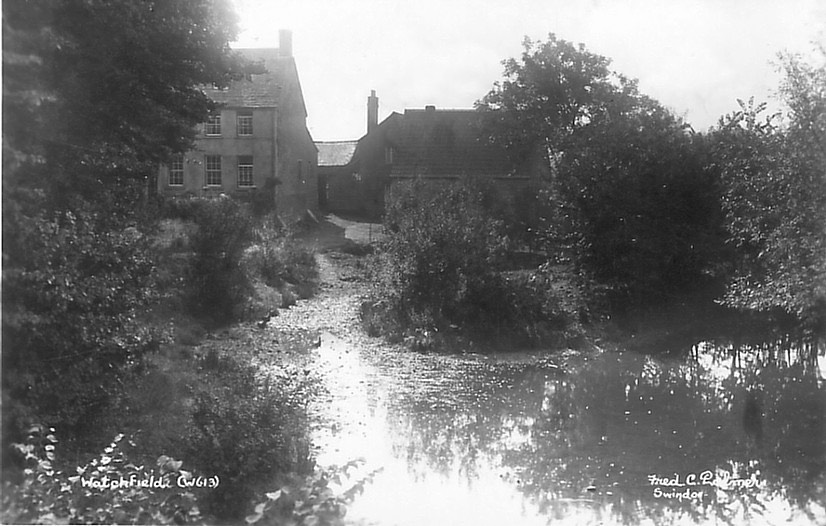Sweeping the country at this particular time, was the popularity of ‘Friendly Societies.’ The idea was that members paid a weekly sum of money into a central fund which was invested with a Bank. If a member fell on hard times or became unable to work through ill-health, then money was made available. Watchfield’s Friendly Society was formed in 1874 and one year later a festival was held to celebrate its anniversary. The Swindon Advertiser reported in May 1875, ‘Shortly after 11 o’clock the members assembled at their club room, formed a procession, and marched to the church, headed by the Lambourne Band. Divine service was conducted by the Rev. W. Humphreys. After service the procession was re-formed and calls made on farmers and principal inhabitants of the parish, returning to the Royal Oak where a substantial dinner awaited them. The chair was taken by the Rev G.W. Murray, vicar of the parish, the Rev W. Humphreys occupying the vice-chair. Several toasts were proposed, and a pleasant day was spent. Many thanks are due to several members of the Ancient Order of Forresters and other friends, who kindly joined in the procession wearing their regalia, helping to swell the numbers and did their best to make the occasion as satisfactory as possible.’
The following year the festival was held slightly later when the Swindon Advertiser reported on Monday 26 June, 1876, that the festivities started by the members paying their complimentary visits to patrons in the village and neighbourhood, followed by divine service at St Thomas’ Church. It continued, ‘After leaving the church a few more calls were made and the members then sat down to a capital dinner at the “Royal Oak” Inn, the Rev W.B. Humfrey and Mr Barrett occupying the posts of honour, and several toasts were cordially received on the removal of the cloth. In the afternoon a visit was made to Mr Giles’s residence, where the light fantastic toe was tripped on the lawn, and after calling on Mr Fereman at Strattenboro’Castle Farm, the company returned to their Club-house for a time, and left there at ten o’clock for home, highly gratified with the day’s proceedings and the ample provision which Mr Pocock made for everybody’s comfort.’
On Saturday 9 June, 1877, the Swindon Advertiser reported that, ‘The third annual Festival of the Watchfield friendly society was held on Weds last. The members formed in procession and went to meet the Wroughton brass band at 9am at Shrivenham. They called on the leading inhabitants in this village and then wended their way to Beckett House, the seat of Viscount Barrington. On returning to their club house, the Royal Oak at Watchfield, they had lunch, and then proceeded to church, where service was conducted by the Rev B.W. Humphrey, Miss Fereman presiding at the harmonium. The address of the rev gentleman, which was founded on the 10v of the 3rd chapter of the 2nd Epistle to the Corinthians, ‘Where the spirit of the Lord is there is liberty,’ was most instructive, and was listened to with marked attention. After service the band led the members through the village, returning to dinner at the clubroom. About 40 sat down. The chair was occupied by the Rev B.W. Humphry, and the vice-chair by Mr C. Barrett. The toasts were of the usual after dinner character. The afternoon was spent in paying visits to the various farms, the farmers most hospitably receiving them and making donations to the funds of the society. At Mr Fereman’s and Mr Gile’s dancing was indulged into the lively strains of the band. The evening was spent by young and old at the Oak-Inn, where all enjoyed themselves.’
By 1881, the Society Festivals were becoming a favourite annual event. The newspaper reported on Saturday, 2 July, ‘On Wednesday last week the members of the Watchfield Friendly Society held their seventh anniversary. The members met the Swindon New Town Band at Shrivenham, at 9 o’clock in the morning and after calling on the principal inhabitants they returned to Watchfield, and after partaking of lunch proceeded to St Thomas’s Church, where prayers and appropriate psalms were read by the Rev W.B. Humphrey. An address by the Rev G.W. Murray, from the 23rd Psalm, dwelling on the words, “I shall not want,” was listened to with marked attention. The hymn, “Oh Lord how joyful is to see the brethren join in love to Thee,” was most heartily sung. Service ended, the members and friends, headed by the band, returned to the Royal Oak Inn, where a substantial dinner was provided for them in a tent. The chairs were occupied by the Rev G.W. Murray and Rev W.B. Humphrey. Among those present were Dr Kennard, Mr Fowler, of Medley Cottage, Shrivenham, Mr Bishop, Mr Williams, etc., when loyal and other toasts were proposed and responded to. The afternoon was spent in making calls, and among those kindly entertaining them were Mr Hunt (Watchfield House) and Mr Giles (West Mill Farm). The evening was spent in dancing, running etc, the most amusing part of the programme being the climbing of a greasy pole, to the top of which was suspended a leg of mutton. After several competitors had failed to climb to the top it was successfully reached by E. Morse. The band playing the National Anthem brought the day’s proceedings to a close, which passed off well. It is only fair to Mr George Heap to say that his band, which was not here for the first time, gave every satisfaction. Among those who kindly contributed to the funds, which has only been established a short time, were the Hon Lady Bloomfield, A. Fairthorne Esq, Mr Percival Hunt, and Mr Giles, of West Mill Farm, leaving the society a balance in hand of £150, notwithstanding the society has been subject to heavy sickness.’
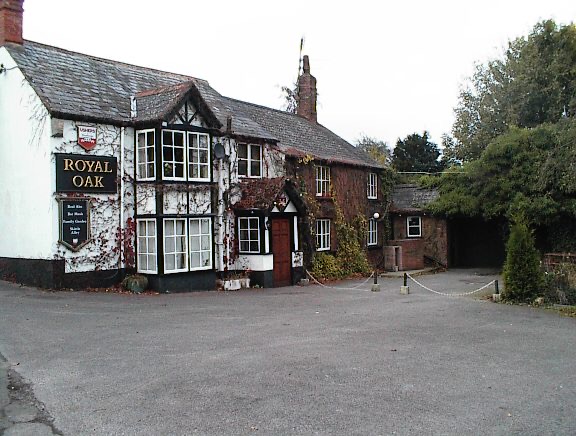
Picture 66. The Royal Oak pub, headquarters of the Friendly Society for many years. Demolished in 2011
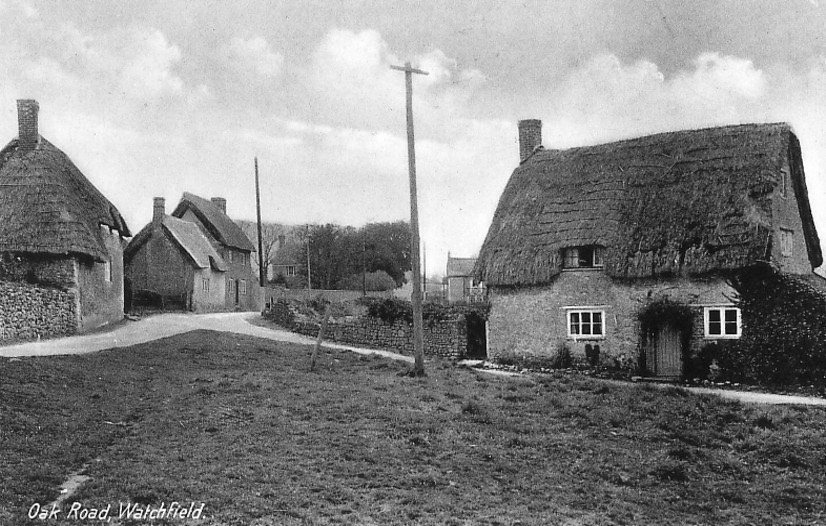
Picture 67 (above). Oak Road in 1935 leading to the pub
Picture 68 (below). A clear view of the pub in the bachground in 1955.
Both pictures Courtesy of Paul Williams
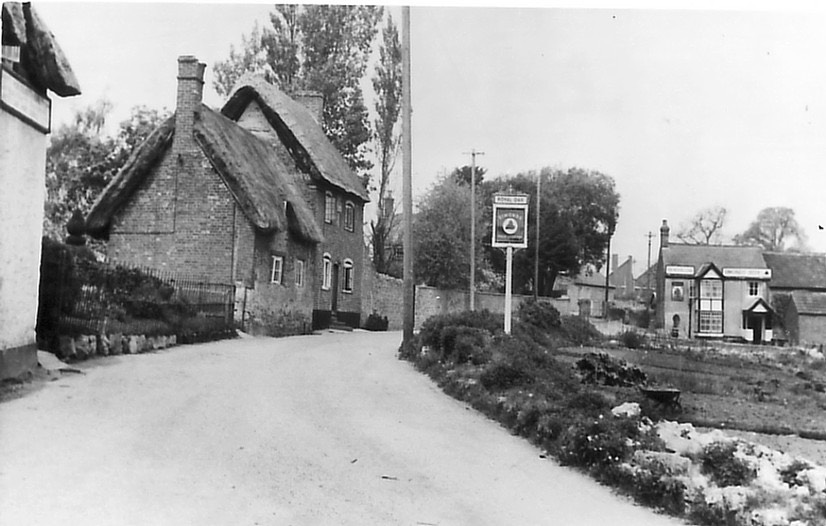
Although a lengthy account, the article that appeared in the Swindon Advertiser dated Saturday 13 June, 1885, is worthy of addition in its entirety as it not only encapsulates the atmosphere of the day, but also provides us with many local names. ‘Another anniversary of this institution was celebrated on Wednesday last under happy circumstances, this being the only day in the year approaching a holiday, the villagers naturally look forward to its recurrence with an amount of pleasure - the more so because it brings relatives and friends together who otherwise would not join hands for probably years. This society, year by year, under able and vigorous management, despite all changes, holds on its way, commanding local popularity and support and dispensing an amount of good then which none needs more to be done or to be more commended when accomplished. This year the weather was most favourable, and the attendance very large, not only of pleasure seekers but those itinerant vendors of amusements in the shape of rifle saloons, roundabouts, coconut throwing, etc. The members met the Swindon Town Band, under Bandmaster Heap, at Shrivenham, at nine o’clock in the morning, making various calls and afterwards proceeding to the clubhouse at Watchfield (the Royal Oak) where a luncheon was provided preparatory to attending Divine Service. This being over the members marched to the church, where the Rev George Wheeler, curate of the parish, who during his residence in the village has endeared himself to the parishioners by his genial uncontentious manner preached a sermon from 1stth Epistle Peter ii, 87 verse, “Honourable men. Love thee brothers. Fear God. Honour the King. “The sermon was characterized by directness of address, great plainness of speech and an earnestness of very stimulative character. The singing throughout the service was most hearty, Mrs Wheeler presiding at the harmonium. Dinner was now placed upon the tables and being aided by an efficient staff on waiters, host Twine proved himself an excellent caterer. Mr Purvis, the Liberal candidate being in the neighbourhood, was waited upon by a deputation asking the honour of his presence at the Dinner. This that gentleman respectfully declined to do, believing that such an act would be misconstrued, or, at all events, a colouring put upon if quite foreign to his nature or desire. A consultation of the members over the luncheon table at which Mr Purvis’s decision was declared, resulted in a cordial and unanimous invitation being again tendered that gentleman, which he accepted, stating that he should refrain from making a speech. The Rev G. Wheeler occupied the chair, Dr Kennard the vice chair. Amongst the visitors were Mr Purvis, Mr Pryce, Mr R. Hedges (Broad Leaze), Mr Poole, Mr McCree, Mr George Baker, Mr Hunter, Mr Collier, Mr B. Woodbridge, Mr J. Tucker, Mr Miller, Mr R. Kent, and others. - After dinner, the Chairman gave the toast of, “The Queen.” Mr Pocock proposed, “The Bishop Clergy and Ministers of all denominations,” to which the Chairman replied in a most humourous speech. - The “Watchfield Benefit Society” was responded to by Mr Miles, who expressed his pleasure in seeing Mr Wheeler in the chair, saying that that gentleman’s genial manner and happy countenance had diffused a beam of happiness over the whole company. - Mr Miles next proposed the health of Dr Kennard, the medical officer, but that gentleman having been unexpectedly called away to attend a case of illness, Mr Morse responded on his behalf. - “The Visitors” was the next toast, the Chairman calling upon Mr Purvis and Mr Hedges to respond. - Mr Purvis, in a few words, thanked the members for their kind invitation, and wished them and their society long life, health and prosperity. - Mr Hedges, who upon rising, was greeted with immense cheering and musical honours, said that for years he had taken an interest in Benefit Societies, had made comparisons, and had seen many dwindle away. He congratulated them upon their success, and urged them to obtain young men as members, that being the true way of realizing a firm basis. - Mr C. Kent proposed the health of the late host and hostess, Mr & Mrs Pocock, eulogizing them for their management of affairs during the past eleven years, to which Mr Pocock suitably replied. - Mr George Baker proposed the health of the present host, Mr Twine responding. - The concluding toast, “The Chairman,” was given by Mr Pryce, who expressed his delight at seeing the harmony existing between the reverend gentleman and the parishioners. - Mr Wheeler, amid cheers and musical honours replied - The afternoon was spent in dancing etc, on the lawn in front of West Mill House, Mr John Giles again extending his hospitality to all comers. The evening’s diversions took place in front of the residence of Mr Boodle, that gentleman very kindly supplying refreshments of various kinds.’
Although the festivals continued annually, the next one of note occurred on 6 June, 1888, when the Swindon Advertiser noted that, ‘A section of the Swindon Town Band, under the able conductorship of Mr George Heap, met the members at Shrivenham, and after parading the village with flags, banners, etc, proceeded to Beckett House. The members afterwards adjourned to their clubhouse, the Royal Oak Inn and partook of luncheon. This ended, the members walked in procession to the Church, where a service appropriate to the occasion was gone through, the Rev G.C. Wheeler (vicar) and the Rev C.G. Wodehouse (Rector of Mongewell) officiating. Mrs Wheeler presided at the harmonium. The Rev Mr Wodehouse, who was formerly curate at Watchfield, preached the sermon from St Mathew vi. 25. After service, dinner was partaken of at the club’s headquarters, Host Jason Twine placing upon the tables (which were ornamented with flowers, etc) a repast worthy of mention and sufficient to satiate the appetite of a gourmand. The Hon Walter Barrington took the chair, and the Rev C.G. Wheeler occupied the vice-chair. Amongst the visitors present were the Rev C.G. Wodehouse, Messrs H. Manners, D.W. Day, C. Kent and J. Pocock. Mr D. Pocock (treasurer), in the course of a few remarks, said that for years past it has been customary to spend the afternoon of their anniversary at West Mill, the residence of Mr J. Giles, who had ever been a friend and supporter of the club, and who aimed at making all comers happy. This year, however, it would be otherwise. He (the speaker) had received a letter from Mr Giles, which ran as follows:- “Please convey my regrets to the club that I cannot have them down this year, owing to the illness of Mrs Giles and myself. I wish you God speed. If all be well next year we will renew old acquaintance. Yours truly, John Giles.” Mr Giles had enclosed a donation of £1 to the club. The Treasurer went on to say that, whilst regretting the circumstances which prevented them from enjoying themselves on Mr Giles’ lawn, the members could not refrain from drinking that gentleman’s health. - The toast was drunk amidst much enthusiasm. - The Rev G. Wheeler announced that he had received a note from the Hon C. H. Stanhope, of Watchfield House, that, owing to a previous engagement he regretted his inability to be present. - The Chairman proposed the toast of, “the Queen, the Price of Wales and the rest of the Royal Family,” which was drunk with musical honours. - Mr D. Pocock submitted the toast of, “the Clergy and Ministers of all denominations,” and in doing so made special reference to the preacher of that day. - The name of the Rev G.C. Wodehouse was coupled with the toast, which was heartily drunk. - In responding, the Rev Mr Wodehouse said he did not feel a stranger among the Watchfield people. It was a great pleasure to him to once again stand in the pulpit of Watchfield to address the members of the club.’
The Friendly Society festival suffered on 26 June, 1889, due mainly to the weather which had brought haymaking time into direct conflict. This meant that many workers were employed in gathering the hay. The following years’ festival was recorded by the paper and a note added that, ‘we omitted to mention that Mr Henry Richens, farmer and horse dealer, of Penny Hooks Farm, invited the members and friends to his residence, where he entertained them ad lib, and also presented them with a sovereign towards club funds.’
The festivals continued through the 1890s as normal, but it’s in the Swindon Advertiser printed on Friday 24 June, 1898, that we learn some interesting information. It reported, ‘The annual Festival of the Watchfield Friendly Society was celebrated as usual on Wednesday, in the Feast week which always follows the First Sunday after Trinity, and many have preferred having their holiday on this day in preference to Monday. The young men and women who have gone out in the world strive to make this occasion their visit to their country home. This was especially so on Wednesday. The weather was gloriously fine, and everything and everybody was gay. Almost every available place was occupied by some kind of amusement for the young. The members of the Society had purchased a new hand sewn silk flag, supplied by Mr G. Tutill, of London. The members assembled at the top of Shrivenham at 9 o’clock, where they were met by the Highworth band. They proceeded to make calls on the principal inhabitants, including the Dower and Manor houses, and the Vicarage, all friends giving a donation. The procession then wended its way along the now beautiful walk from Shrivenham to Watchfield.’
However, the following year, we gain a little more information about the ‘Feast Week’ when the newspaper reports on Friday 16 June, 1899, ‘The annual festival of the Watchfield Friendly Society was celebrated as usual on Wednesday in the feast week, which always follows the First Sunday after Trinity. The feast may now be looked upon as almost obsolete. The writer remembers when there were great revellings on the Monday in the township of Shrivenham, which comprises the hamlets of Watchfield and Bourton.’ In the last festival of the 19th century, the newspaper continued, ‘Services over, a call was made at the parsonage, and then the company adjourned to the Royal Oak, where a capital repast awaited them. The chair was occupied, as in former years, by the Vicar, supported by the Rev J. Footman, Colonel Goodchild and son, Mr j. Farre-Hutson (Watchfield House), Dr Kennard, and Dr Powell. Among the visitors were also Mr T. Phipps of the Barrington Arms, Mr T. Fuller, Mr R. Stone, PDCR, AOF., Shrivenham etc. Full justice was done to the things provided, of which about 50 partook, which must have resulted in a financial loss to the caterer. The Chairman first gave the Queen’s health, and said her reign had been as good as it had been long. Mr Farre-Hutson then gave, “The Clergy.” The Revs E.F. Hill and J. Footman, and Mrs Miles briefly replied. The Chairman then gave, “The Society,” and spoke in praise of such societies. If a man was never thrown on the funds he had the consolation in knowing he had helped others. Mr Miles, the Chairman of the Society, replied to this toast for the 28th time, remarking what a pleasure it was to meet so many old faces once a year. The Chairman then gave the toast of, “The Surgeon of the Society.” Dr Powell suitably replied. “The Visitors,” proposed by Mr Footman, was responded to by Colonel Goodchild and Mr Phipps. The Chairman in a humorous speech proposed the health of Mr Farre-Hutson, and in the course of his remarks observed that Mr Farre-Hutson was a man against whom no person could possibly have a grudge. The band having played “He’s a jolly good fellow,” Mr Farre-Hutson briefly but suitably replied. “The health of the Chairman,” and, “The Host and Hostess,” brought the list of toasts to a close. Before the meeting ended a telegram was received from Mr A.K. Lloyd, QC, MP, who wrote from the House of Commons, regretting he could not be present, but would send his usual subscription (one guinea) later. ’
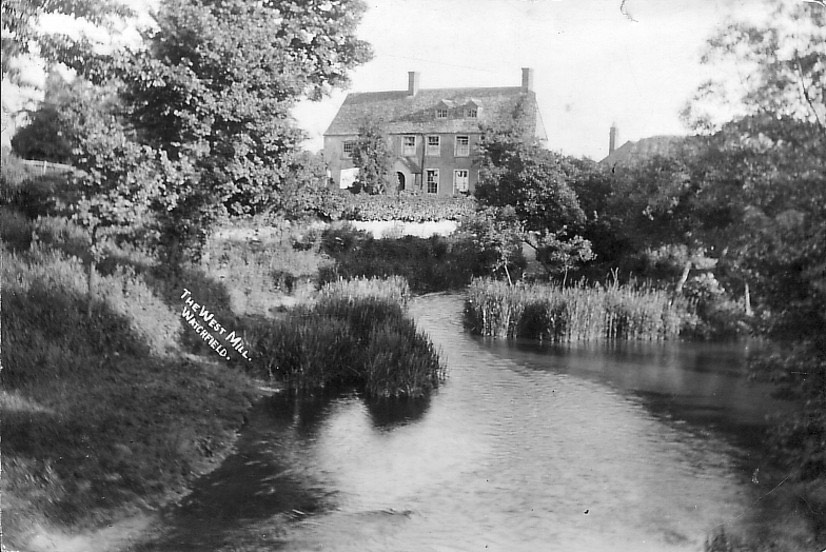
Pictures 69 & 70. For many years the Friendly Society members danced on the lawns outside West Mill House. These two pictures show the house from the same view but at different times, 1910 above and 1925 below.
Both pictures Courtesy of Paul Williams
